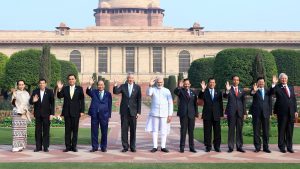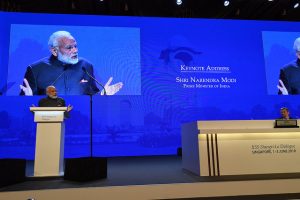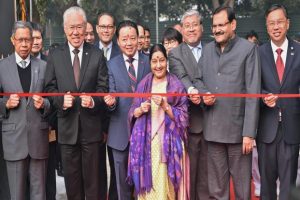
The entire world will be literally on the table, specially the much-contested Indo-Pacific region, when India’s Prime Minister Narendra Modi and the leaders of the 10 ASEAN countries hold their first-ever breakfast summit in the glittering island-state of Singapore on November 15.
What’s on the menu?
The visit by PM Modi to Singapore, his second trip to ASEAN’s powerful economy in a little over five months, will last barely 36 hours, but a lot can happen over this power-packed breakfast, as an ad jingle goes, with the menu encompassing a host of geopolitical crises and the evolving regional order.
This is the first time an Indian prime minister will be engaging leaders of the ASEAN countries in the format of a breakfast summit meeting. The reason is rather technical: after pomp and pageantry of the India-ASEAN commemorative summit in New Delhi on January 25, 2018, there is a lot to chew on and deliver; and ASEAN can’t hold another summit with the same dialogue partner twice in a year. In a sense, the breakfast meeting offers a refreshing break from the staid formality of formal summits, and provides space for the leaders to engage in informal tete-a-tete to discuss all-too-real issues that get lost in highfalutin rhetoric.
Going beyond the veneer of political correctness, one only hopes that PM Modi and the leaders of ASEAN countries have a brutally candid conversation on why India-ASEAN economic relationship remains so underleveraged. Between them, India and ASEAN account for nearly $5 trillion GDP and are home to 1.9 billion people, but bilateral trade has hovered in the range of $75-80 billion in the last few years. Some will say that the comparison with China is gratuitous and distracting, but it’s time to get serious if India’s ambition of providing a viable alternative to ASEAN countries is to have any traction.
Compared to China-ASEAN trade of over $450 billion, India-ASEAN trade is hovering around $75-800 billion. The much-iterated target of $100 billion remains as elusive as ever. Unless ASEAN countries significantly increase investment in India and open their markets to India services trade and skilled professionals, the economic relationship can only go this far.
Navigating the Indo-Pacific matrix

Going beyond transactional issues of trade and investment, what will mark out the India-ASEAN breakfast meeting and other associated meetings, including the East Asia summit, is the growing salience of the Indo-Pacific in the evolving regional architecture. Ever since PM Modi’s defining address at the Shangri-la Dialogue in Singapore on June, much water has flowed, with major players like the US and Japan coming out with competing and differing notions of the Indo-Pacific.
In his address, PM Modi enunciated his vision of an inclusive Indo-Pacific deftly and refused to pander to wishes of China-baiters by stressing that the Indo-Pacific can’t be a limited club of the select few. In a message aimed at allaying apprehensions of ASEAN countries amid anxieties sparked by the quadrilateral dialogue, PM Modi underscored the centrality of ASEAN in driving the Indo-Pacific. This message is going to be emphatically reiterated by PM Modi at the India-ASEAN breakfast meeting as well as in his interactions with the leader of East Asian countries. “The Indo-Pacific has been enunciated: an open and a free, progressive, prosperous Indo-pacific region which is inclusive and respects international law. The discussions about working in the region together and what other countries have to say on Indo-Pacific is something which would happen there because we are going to the region and we are in the region and there will be talks on how different countries look at Indo-Pacific,” said Ms Vijay Thakur Singh, Secretary (East) in India’s ministry of external affairs.
Whither Quad
PM Modi is also going to underscore the distinction between the Indo-Pacific and the Quadrilateral dialogue in India’s evolving geopolitical calculus by stressing on the Quad’s importance for regional peace and prosperity, without getting entangled in China containment games. The US and Japan may want the Quad to become an aggressively anti-China alliance, but India is set to resist the seductive and misleading rhetoric of China containment. Building on the Wuhan consensus forged with Chinese president Xi Jinping, PM Modi is expected to play safe and underscore cooperative aspects of the Quad and Indo-Pacific without drawing China into this intricate matrix. It is against this backdrop, senior officials of India, the US, Japan and Australia at the level of joint secretaries are expected to hold their third meeting in Singapore on November 15.
Two billion dreams

Looking ahead, the real story of India-ASEAN relations can only have greater public resonance if this mutually empowering engagement dovetails with dreams and aspirations of over 1.9 billion people living in these two regions. Geopolitical machinations may seem tempting, but the “Power of 11” (ASEAN + India) can only turn real when issues relating to poverty mitigation and financial inclusion are addressed forthwith, sans feel-good rhetoric. PM Modi is doing the right thing by beginning his visit to Singapore with the Fintech Festival where he is expected to launch a pioneering banking platform, called APIX, which will interlink leading financial technology companies of India and ASEAN countries with a view to benefitting two billion people without bank accounts in 23 countries, including the 10 ASEAN members and India. ASEAN and India, and the region, needs more of such people-centric initiatives to fructify the promise of an inclusive Asian Century.
Author Profile

- Manish Chand is Founder and Editor-in-Chief of India Writes Network (www.indiawrites.org) and India and World, a pioneering magazine focused on international affairs. He is CEO, Centre for Global India Insights, an India-based think tank focused on global affairs.
Latest entries
 India and the WorldFebruary 17, 2026South-by-South: Focus on people-centric solutions at India AI summit
India and the WorldFebruary 17, 2026South-by-South: Focus on people-centric solutions at India AI summit India and the WorldFebruary 7, 2026Modi hails interim India-US trade deal, Goyal says no concessions made on agriculture
India and the WorldFebruary 7, 2026Modi hails interim India-US trade deal, Goyal says no concessions made on agriculture India and the WorldFebruary 2, 2026Trump announces trade deal with India, Modi ‘delighted’
India and the WorldFebruary 2, 2026Trump announces trade deal with India, Modi ‘delighted’ India and the WorldJanuary 31, 2026Palestinian minister bats for mediatory role for India in ending Gaza conflict
India and the WorldJanuary 31, 2026Palestinian minister bats for mediatory role for India in ending Gaza conflict







